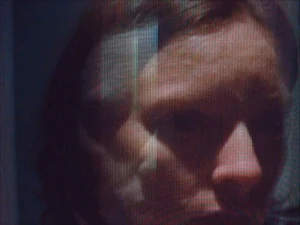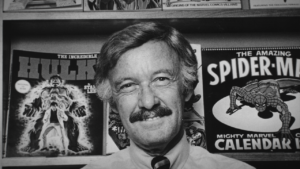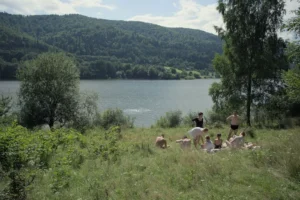Allen’s Auteur Dilemma
In "Match Point," Woody Allen abandons his quirky cosmos for beauty and treachery. Sheerly Avni explores why greatness continues to elude the self-effacing filmmaker.“If I was a teacher,” Woody Allen told Vanity Fair in its December issue, assessing his 40-year career as a filmmaker, “I’d give myself a B.”
Allen went on to explain that he is not a true genius, that he’d never made his “Seventh Seal” or “The 400 Blows.” In a telling self-diagnosis, Allen blamed his failures on a missing “depth of humanity.” “I’m not going to play like Michael Jordan,” he said, “I also will not make films like Kurosawa or Bergman.”
Now with “Match Point,” Allen has made a film that on the surface is not even really like Woody Allen.
Gone are the neuroses, the pessimistic aphorisms, the stuttering conversations we’ve grown to love and hate, gone are his rarefied uptown living rooms and strolls through Central Park. Instead Allen serves up an unapologetically glamorous world of upper-class London, complete with hot young actors, a plot-driven suspense drama, a gloriously overblown operatic soundtrack and the best supporting cast the director’s new deal with the BBC can buy.
“Match Point” is, in a word, slick.
The movie’s protagonist, Chris Wilton, played by Johnathan Rhys-Meyers, is also slick: a working-class tennis pro who, like Allen himself, claims to have crashed against the limits of his own near-greatness. “I would rather be lucky than good,” Chris tells us, and we spend the rest of the movie discovering whether he is either. Though he has shared courts with the greatest tennis players of his day, playing them has convinced him that he is not in their league, just as Allen is convinced that he is not in the league of his idols. Chris takes a job as a tennis instructor at a posh British club, and thus begins his unsentimental education. His student, Tom Hewett (Matthew Goode), takes a liking to him, while sister Chloe Hewett (the always wonderful Emily Mortimer) takes a yearning to him — and during a night at the opera with the Hewett family the seductive young man finds himself wholly embraced by the fine old arms of the British upper crust.
But then, as she is wont to do, Trouble walks through the door, in the form of Tom’s American girlfriend Nola, an aspiring actress just good enough to get an agent and not good enough to get a part. As Nola, the effervescent Scarlett Johansson seduces us all: She murmurs, she sways, she pouts, she brushes golden hair out of sultry green eyes, and she and Rhys-Meyers halfheartedly fight and wholeheartedly succumb to an attraction that is, um, fatal.
We are meant to believe that both these fortune hunters succumb to a carnal urge that is based in part on their similarities. Like him, she is from humble roots, she is temperamental, she drinks too much, she is irresistible. In one scene Nola even tells Chris that she is sexy but not beautiful.
Unfortunately, the opposite is true, not just for Nola or Chris but for the movie as a whole: Johansson and Rhys-Meyers are distractingly beautiful — their lips alone could bend the time-space continuum — but no matter how hard Chris and Nola slam together, we never feel the heat. Part of the problem is physical casting: Rhys-Meyers has neither the rugged athleticism nor the aggressive grace of the world-class athlete he is portraying, and the lethal but ultimately unwholesome sexiness of Johansson’s character calls for the slovenly allure of a young Lena Olin, or maybe an older Angelina Jolie, but the 21-year-old Johansson is still far too much of an ingnue on the upswing to be believable as an ingnue on the downswing.
Herein lies the danger of slick. Even with all its (literal) rutting in the mud, this cool, considered movie refuses to get dirty. We watch, amused but not invested, as Chris and Nola, Chloe and Tom absently navigate their morally compromised universes. “Match Point” is a thriller — of sorts — and the movie holds our interest, if not our affection, as the misdemeanor of Chris’ affair spins out of control into crime.
So far, critics have fallen over themselves praising the ingenuity of the movie’s twists and turns, and while it’s true that the ending (which I’ll not give away here) does come as a surprise, it does not in any way shock or jolt the viewer into any sense of moral reckoning. Allen wants us to ask ourselves hard questions about luck, and greed, and his recurrent cinematic preoccupations with existential dilemmas: Do our lives have meaning? Is there any ethical or karmic quid pro quo in the universe? Are our fates governed by God or by Chance? But “Match Point’s” sleek surfaces repel as much as they impress, and instead the mind tends toward more idle curiosities: Would a young Diane Keaton have been considered pretty enough to play a love interest in the surgically enhanced 21st century? And do rich people in England still spend this much time shooting guns in the air?
“I just don’t have the humanity,” Allen told Vanity Fair, and it sounded like a copout. He may be right about “Match Point,” but he’s wrong about his career. In his 30s and 40s and well into his 50s, Allen’s films were bursting with affection and warmth. Even at their most self-loathing and petty, the assemblage of neuroses Allen managed to incorporate into characters, especially the ones he played himself, always spoke to us. From the Chaplinesque schlemiels of early comedies like “Sleeper” and “Take the Money and Run” to the lovelorn would-be Don Juans of the ’70s classics “Annie Hall” and “Manhattan,” Allen’s protagonists, especially the men, reminded us of our own bumbling love-seeking selves, hopelessly romantic and also hopelessly mired in all the distracting second-guessing and confusion of a certain kind of well-heeled, over-cultured modernity.
This was the beloved Woody Allen of yore, but as the director moved toward the bleak landscapes of “Deconstructing Harry” and “Husbands and Wives,” he offered characters who hover between self-absorption and borderline sociopathy. His work has suffer less from a deficit of humanity than from a conscious decision to abandon it, falling back instead on the dark misanthropy that has shadowed his recent work, including “Match Point.”
There is hope though, and that hope lies in the corners and recesses of this latest film, his first but not last London production (a second British venture, “Scoop,” is due out in a few months). The secondary roles in “Match Point” all go to top British actors, who light the screen every time they appear. The astonishingly talented Colin Salmon spends less than five minutes on screen as a concerned neighbor, but in those five minutes he projects enough decency to — for a moment — make us share his bewilderment and shock. And James Nesbitt and Ewen Bremner fairly steal the movie altogether, in small but pivotal roles as two decidedly unglamorous police detectives investigating a case. Their easy, musically accented banter gives us, too late, a human entree into the action, and remind us to care.
Woody Allen is only 70 years old. He has some years ahead of him, and in the past four decades he has become a master of his craft. Now if he would only choose to show as much respect for his Hamlets and Gertrudes as he does for his Rosencrantzes and Guildensterns he might still achieve the greatness that has eluded him so far. The game is not yet over, and the outcome of Allen’s own match point will depend on the direction he chooses to take: Luck has nothing to do with it.
Your support matters…Independent journalism is under threat and overshadowed by heavily funded mainstream media.
You can help level the playing field. Become a member.
Your tax-deductible contribution keeps us digging beneath the headlines to give you thought-provoking, investigative reporting and analysis that unearths what's really happening- without compromise.
Give today to support our courageous, independent journalists.






You need to be a supporter to comment.
There are currently no responses to this article.
Be the first to respond.